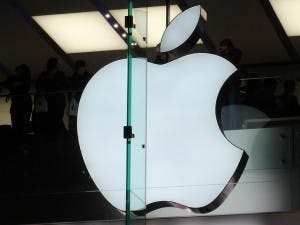While investors have been clamoring for the return of a portion of Apple Inc. (NASDAQ:AAPL)‘s $145 billion of cash, it appears that the company is planning on issuing debt to fund this repayment. If you’re scratching your head, wondering why the most cash-rich company on the planet would be taking out a loan, there’s a good reason. U.S. tax law makes a loan the smarter play for Apple and for shareholders.
The new capital plan

Image: Apple Inc. (NASDAQ:AAPL)
Under the new capital plan, the company will increase the dividend by 15% to $3.05 per share, beginning with the May 16 payment. In addition, the company said it will increase its stock buyback plan from $10 billion to $60 billion by the end of 2015. The total plan is expected to put about $100 billion back into the hands of investors in the next two and a half years. Piper Jaffray’s Gene Munster called the plan a beginning, saying: “They want it all today. They want it faster.”
So why is Apple Inc. (NASDAQ:AAPL) borrowing the money?
To fund a portion of the stock repurchase plan, Apple will issue debt to cover the cost. While it seems unthinkable to borrow money to return to investors rather than tapping the huge cash stockpile on the company’s books, stringent U.S. tax policy is to blame. The U.S. carries a corporate tax rate of roughly 35%, making it one of the highest in the world. More than 65% of Apple Inc. (NASDAQ:AAPL)’s cash is held overseas, meaning that the tax bill of repatriating that much capital would be significant.
Rather than take the tax hit, the company will borrow the money it needs to return cash to investors.
If you’re now thinking it’s absurd that making a company issue debt to more effectively move cash back onshore, which will have the net effect of a tax-free offset, be thankful that the company is choosing to be conscientious. A structure by which companies are penalized for bringing money home, or forcing them to resort to accounting ploys, might explain why so many have moved operations overseas in the first place.
After Cisco‘s last earnings call, CEO John Chambers said that as long as U.S. tax policy forced money to remain abroad, he would manage his company’s cash to the benefit of shareholders. He pushed for tax reform in his comments but refused to alter company policy to serve short-term needs. Apple Inc. (NASDAQ:AAPL) faces the same issue and is responding similarly.
While the new capital plan may not fully address the desires of some shareholders, it goes a long way to putting cash back into the hands of investors. With the heightened dividend and attractive valuation, the stock is cheap and deserves an allocation. Apple Inc. (NASDAQ:AAPL) doesn’t need a loan, but it’s taking one to satisfy the best interests of its shareholders.
The article Does Apple Need a Loan for Billions? originally appeared on Fool.com.
Fool contributor Doug Ehrman has no position in any stocks mentioned. The Motley Fool recommends Apple and Cisco Systems (NASDAQ:CSCO) and owns shares of Apple.
Copyright © 1995 – 2013 The Motley Fool, LLC. All rights reserved. The Motley Fool has a disclosure policy.




